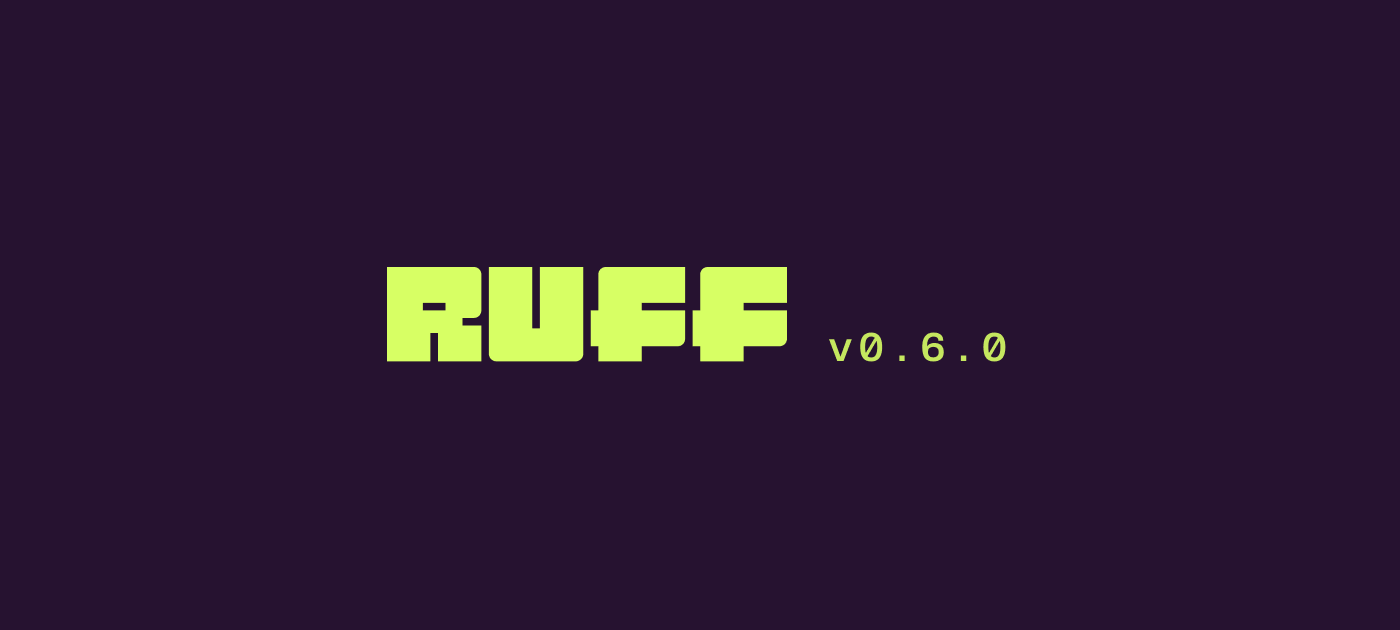Ruff v0.6.0 is available now! Install it from PyPI, or your package manager of choice:
pip install --upgrade ruffAs a reminder: Ruff is an extremely fast Python linter and formatter, written in Rust. Ruff can be used to replace Black, Flake8 (plus dozens of plugins), isort, pydocstyle, pyupgrade, and more, all while executing tens or hundreds of times faster than any individual tool.
Migrating to v0.6 #
As with Ruff 0.5, this release contains few breaking changes: most of our users should be able to upgrade to the latest Ruff version without having to make any significant edits to their code or configuration. But with that said, here are a few things to keep in mind when upgrading:
-
Several rules have been deprecated after it was decided that they made recommendations that were either inaccurate or unhelpful:
-
By default, our
isortrules now search insidesrc/directories when determining the list of package names that are likely to represent first-party code. This was always configurable, but it was suprising for many users that Ruff didn't understand this common project structure "out of the box".This change may result in some of your imports being reordered or recategorised, as import statements that these rules previously considered to be third-party imports will now be correctly understood as first-party.
-
The
unnecessary-dict-comprehension-for-iterablerule has been recoded fromRUF025toC420, ensuring Ruff's code is consistent with the same rule in theflake8-comprehensionsplugin.
Jupyter notebooks are now linted and formatted by default #
Ruff has supported linting and formatting Jupyter notebooks for a long time. In previous Ruff
versions, however, Ruff would only lint and format notebooks if you added
extend-include = ["*.ipynb"] to your Ruff configuration file. (Ruff would also lint any files that
you explicitly passed to Ruff on the command line, including .ipynb files.)
In Ruff 0.6, this behavior has changed. When passed a directory of files to lint or format, Ruff
will now search for .ipynb files within that directory in exactly the same way as it would for
.py or .pyi files — with no extra configuration necessary. We added this as a preview-mode
feature in Ruff 0.5.6; this release promotes it to stable.
If you'd rather Ruff left your notebooks alone, you'll still be able to get the old behavior by
setting a custom extend-exclude setting in your
Ruff configuration. For example, in a pyproject.toml file:
[tool.ruff]
extend-exclude = ["*.ipynb"]For more fine-grained control over how Ruff handles notebook files, here's how you'd tell Ruff that you'd like your notebooks formatted, but not linted:
[tool.ruff.lint]
exclude = ["*.ipynb"]Here's how you'd tell Ruff that you'd like your notebooks linted, but not formatted:
[tool.ruff.format]
exclude = ["*.ipynb"]And to disable specific lint rules on notebooks, you can use Ruff's
per-file-ignores setting:
[tool.ruff.lint.per-file-ignores]
"*.ipynb" = ["E501"] # disable line-too-long in notebooksDefault behavior changed for flake8-pytest-style rules #
We've changed the default behaviour for
pytest-fixture-incorrect-parentheses-style
and
pytest-incorrect-mark-parentheses-style
(PT001 and PT023 respectively).
Previously, PT001 would by default change @pytest.fixture decorators to @pytest.fixture(), and
PT023 would change @pytest.mark.foo decorators to @pytest.mark.foo(). They will now both
remove parentheses by default, rather than adding them. This means that these rules now adhere more
closely to the style recommendations made by the official pytest project.
These rules are both configurable. To revert to Ruff's previous default behaviors, use the
lint.flake8-pytest-style.mark-parentheses
and
lint.flake8-pytest-style.fixture-parentheses
settings in your Ruff configuration file. For example, in a pyproject.toml file:
[tool.ruff.lint.flake8-pytest-style]
fixture-parentheses = true
mark-parentheses = trueThese rules also both come with safe autofixes, so you should be able to easily fix any new
violations of these rules caused by this change by running
ruff check . --fix --select=PT001 --select=PT023.
Rule stabilizations #
This release stabilizes nine rules originally derived from the pylint linter, all of which were
previously only available with --preview:
singledispatch-method(PLE1519)singledispatchmethod-function(PLE1520)bad-staticmethod-argument(PLW0211)if-stmt-min-max(PLR1730)invalid-bytes-return-type(PLE0308)invalid-hash-return-type(PLE0309)invalid-index-return-type(PLE0305)invalid-length-return-type(E303)self-or-cls-assignment(PLW0642)
Two PYI rules (originally derived from the flake8-pyi linter), and one RUF rule, have also been
stabilised:
byte-string-usage(PYI057)duplicate-literal-member(PYI062)redirected-noqa(RUF101)
Other behavior stabilizations #
This release also stabilizes several preview-mode features relating to our ASYNC rules.
ASYNC100, ASYNC109, ASYNC110, ASYNC115 and ASYNC116 have all had their scope increased so
that they detect antipatterns in asyncio and anyio code as well as antipatterns in trio code:
cancel-scope-no-checkpoint(ASYNC100): Supportasyncioandanyiocontext mangers.async-function-with-timeout(ASYNC109): Supportasyncioandanyiocontext mangers.async-busy-wait(ASYNC110): Supportasyncioandanyiocontext mangers.async-zero-sleep(ASYNC115): Supportanyiocontext mangers.long-sleep-not-forever(ASYNC116): : Supportanyiocontext mangers.
Finally, autofixes have been promoted to stable for the following rules in our flake8-return
category:
superfluous-else-return(RET505)superfluous-else-raise(RET506)superfluous-else-continue(RET507)superfluous-else-break(RET508)
View the full changelog on GitHub.
Read more about Astral — the company behind Ruff.
